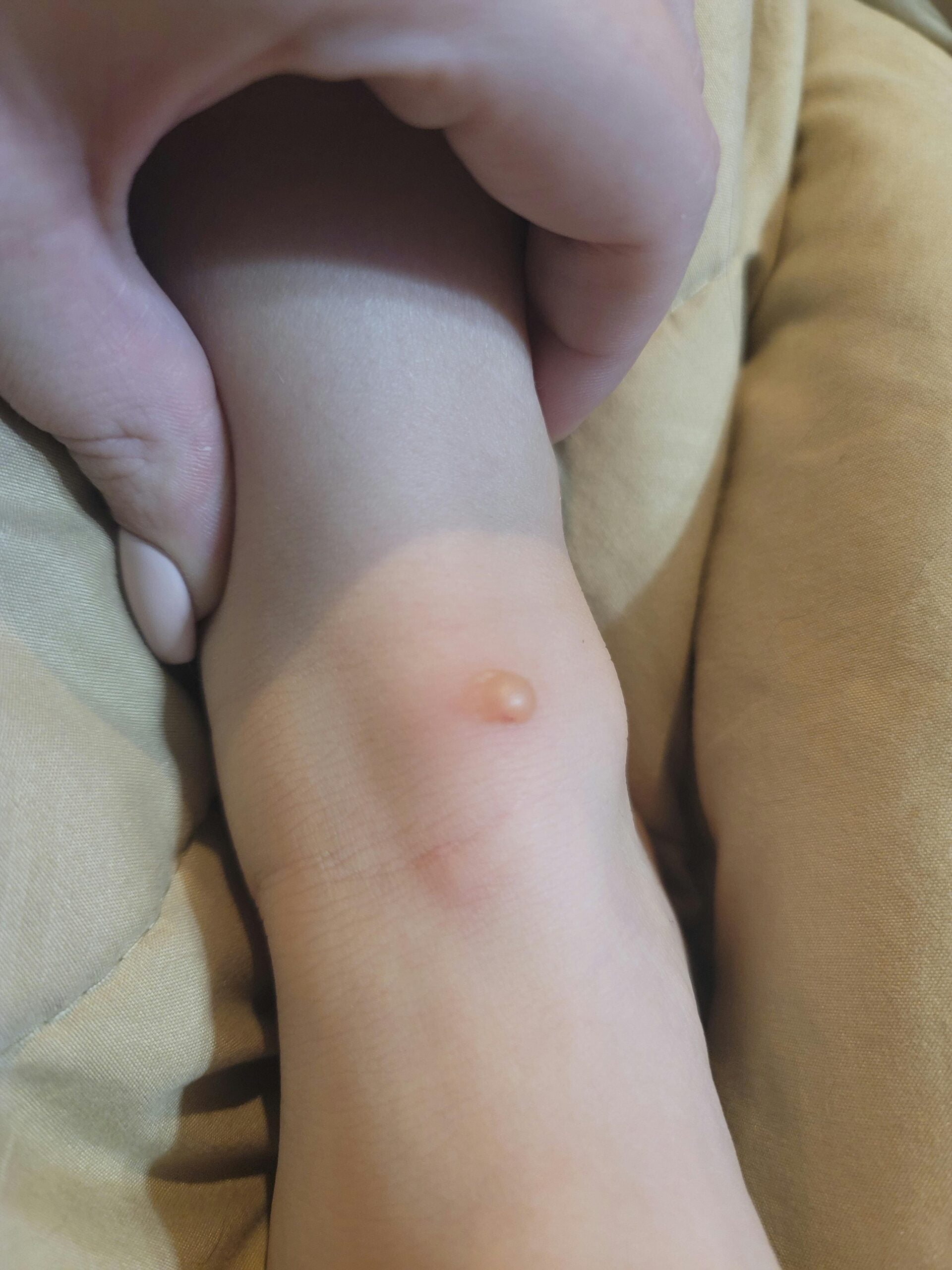Popping mosquito bites is not safe and should be avoided. According to Dr. Wassef, squeezing the area of the bite isn’t going to remove the mosquito saliva from your skin.
In fact, it can increase the risk of infection and cause further issues. It is best to let the bite heal naturally. Mosquito bites can be itchy and uncomfortable, but there are many remedies available to alleviate the symptoms without resorting to popping the bite.
We will explore why popping mosquito bites is not safe, the potential risks of doing so, and effective ways to treat mosquito bites to relieve itching and discomfort.
The Lure Of Popping
Popping mosquito bites may provide temporary relief, but it can increase the risk of infection and prolong healing. Draining a bite like a pimple can lead to further complications and is best avoided. Instead, apply soothing lotions or ice packs to alleviate itching and discomfort.
Resisting The Urge
When a mosquito bites, it injects saliva into the skin which can cause an itchy and irritating bump. This urge to scratch or pop the bite can be overwhelming, but it’s important to resist the temptation. Popping a mosquito bite can lead to further complications and may not provide the relief you seek.Immediate Relief Vs. Long-term Consequences
While popping a mosquito bite may provide immediate relief, it can have long-term consequences. When you pop a bite, you increase the likelihood of infection and scarring. This is because the bacteria from your hands and nails can enter the open wound, causing an infection. Furthermore, by popping the bite, you may be spreading the mosquito saliva to other areas of the skin, leading to more bites.The lure of popping mosquito bites can be difficult to resist, especially when you’re seeking immediate relief. However, it’s important to consider the long-term consequences and avoid popping or scratching the bite. Instead, try using over-the-counter creams or ointments to reduce the itching and swelling. If the bite becomes infected or you experience severe symptoms, seek medical attention.
Credit: www.reddit.com
Mosquito Bite Anatomy
Mosquitoes use their sharp, elongated mouthparts to pierce the skin and feed on blood.
Saliva As The Culprit
When a mosquito bites, it injects saliva containing anticoagulants to prevent blood clotting.
Infection Risks
Mosquito bites can be incredibly itchy and tempting to pop, but doing so can increase the risk of infection. When the skin barrier is broken, it creates an entry point for bacteria, leading to potential complications.
Breaking The Skin Barrier
When you pop a mosquito bite, you break the protective barrier of the skin, leaving it vulnerable to bacteria and other pathogens. This increases the likelihood of an infection taking hold.
When Bacteria Invade
If bacteria invade the broken skin, it can lead to localized infection, causing redness, swelling, warmth, and pain around the affected area. In severe cases, it may even lead to systemic infection and require medical intervention.

Credit: www.today.com
Potential For Scarring
It is not safe to pop mosquito bites as it increases the risk of infection and potential for scarring. Squeezing the area of the bite won’t remove the mosquito saliva from your skin and can cause further issues. It’s best to avoid squeezing or scratching mosquito bites.
Skin Healing Process
Mosquito bites go through a natural healing process.
Marks And Blemishes
Improperly popping mosquito bites can lead to marks and blemishes.
Proper Care Techniques
When it comes to dealing with mosquito bites, it’s crucial to apply proper care techniques to prevent further discomfort and potential infections. Following the right first aid measures and utilizing effective methods to soothe itch and inflammation can significantly aid in the healing process.
First Aid For Bites
Upon getting a mosquito bite, it’s important to take immediate action to minimize the impact. Here are the essential first aid steps to follow:
- Clean the affected area with mild soap and water to prevent infection.
- Apply an ice pack or a cold compress to reduce swelling and alleviate itching.
- If the bite develops into a blister, refrain from bursting it to avoid potential infections.
Soothing Itch And Inflammation
Dealing with the itch and inflammation caused by mosquito bites can be bothersome, but there are effective methods to soothe the discomfort:
- Using over-the-counter antihistamine creams or lotions can help reduce itching and inflammation.
- Applying calamine lotion or a paste made of baking soda and water can provide relief from itching.
- Avoid scratching the bite to prevent further irritation and potential infections.
When Bites Worsen
Popping mosquito bites is not safe as it can increase the risk of infection. It is best to avoid squeezing or scratching the bites to prevent further complications.
Identifying Infected Bites
Mosquito bites can become infected if they are red, swollen, and warm to the touch.
- Look for pus or drainage coming from the bite.
- Infected bites may also feel more painful than usual.
Seeking Medical Attention
If you notice signs of infection, seek medical help immediately.
- Medical professionals can provide proper treatment to prevent complications.
- Do not try to pop or drain an infected mosquito bite at home.
Alternative Remedies
Popping mosquito bites is not safe as it can lead to infection. It’s best to avoid squeezing them and instead opt for alternative remedies like applying anti-itch creams or aloe vera to soothe the irritation. Remember, prevention is key to avoiding discomfort from mosquito bites.
Natural And Home Solutions
Some natural remedies for mosquito bites include:
- Applying a cold compress to reduce itching and swelling.
- Using aloe vera gel for its soothing properties.
- Applying raw honey for its antibacterial benefits.
Over-the-counter Options
Consider over-the-counter remedies like:
- Hydrocortisone cream to reduce itching and inflammation.
- Calamine lotion to soothe the affected area.
- Antihistamine creams to alleviate itching.
Prevention Strategies
Popping mosquito bites is not recommended as it can increase the risk of infection. It is best to avoid squeezing or scratching the bites and instead, use prevention strategies like applying anti-itch creams or taking oral antihistamines to alleviate the itchiness.
When it comes to dealing with mosquito bites, prevention is key. Here are some effective strategies for avoiding mosquito bites altogether:Avoiding Mosquitoes
- Stay indoors during peak mosquito hours, typically around dusk and dawn.
- Wear long-sleeved shirts and pants to cover exposed skin.
- Use screens on windows and doors to keep mosquitoes out of your home.
- Eliminate standing water around your home, as this is where mosquitoes breed.
Repellents And Protective Measures
There are a variety of mosquito repellents and protective measures you can use to prevent mosquito bites, including:- DEET-based insect repellents are effective and safe for most people.
- Wear clothing treated with permethrin to repel mosquitoes.
- Use mosquito nets when sleeping outdoors or in areas with high mosquito populations.
- Consider using electronic mosquito repellent devices.
Understanding Allergic Reactions
Recognizing Allergy Symptoms
Mosquito bites can trigger allergic reactions in some individuals. It’s important to recognize the symptoms of an allergic reaction to a mosquito bite, which may include:
- Hives or welts
- Swelling beyond the bite area
- Difficulty breathing
If you notice any of these symptoms after being bitten by a mosquito, it’s crucial to seek medical attention promptly.
When To Worry About Anaphylaxis
Anaphylaxis is a severe, life-threatening allergic reaction that requires immediate medical intervention. If you experience the following symptoms after a mosquito bite, it could indicate anaphylaxis:
- Difficulty breathing
- Rapid swelling, especially around the face and throat
- Dizziness or fainting
If you or someone around you shows these symptoms, call for emergency help right away.
Credit: www.quora.com
Frequently Asked Questions
Can You Squeeze Mosquito Bites?
It is best to avoid squeezing or scratching mosquito bites. Squeezing the area of the bite won’t remove the mosquito saliva from your skin. It may also increase the risk of infection. Instead, try applying a cold compress or an anti-itch cream to alleviate the itchiness.
What Happens If I Pop A Mosquito Bite?
Popping a mosquito bite can increase infection risk. It’s best to avoid squeezing or scratching them.
Can You Drain A Mosquito Bite?
Draining a mosquito bite is not recommended as it can increase the risk of infection. It is best to avoid squeezing or scratching mosquito bites to prevent further complications. Applying a warm compress can help ease the pain and promote healing.
If the bite becomes infected, seek medical attention for proper treatment.
Conclusion
It’s best to avoid popping mosquito bites as it can lead to infections. Although it may provide temporary relief, the risk of complications outweighs the benefits. Instead, consider using anti-itch creams or cold compresses to alleviate discomfort and promote healing.
Prioritize your health and well-being by refraining from popping mosquito bites.
Related posts:

I’m MD Tanvir, and I bring years of expertise gained from working closely with pest control companies to the forefront. My journey in the industry has inspired me to launch Bug Battler, a platform aimed at equipping people with the know-how to combat pests autonomously. Through Bug Battler, I aim to empower individuals with practical insights to tackle pest infestations effectively.

